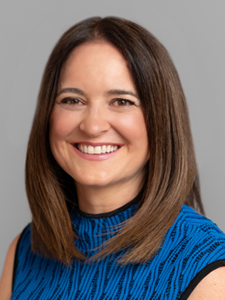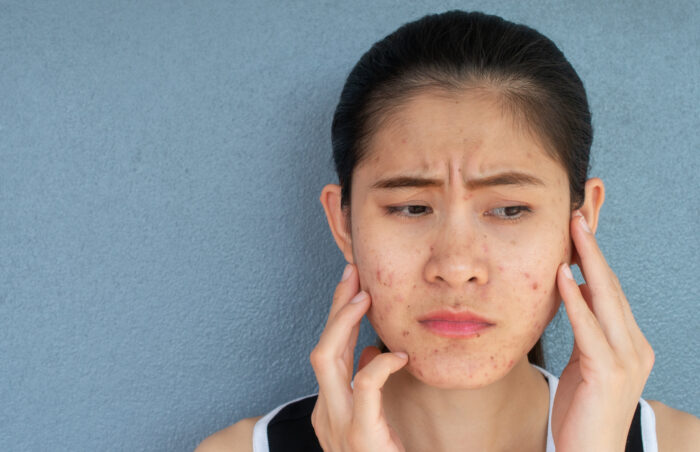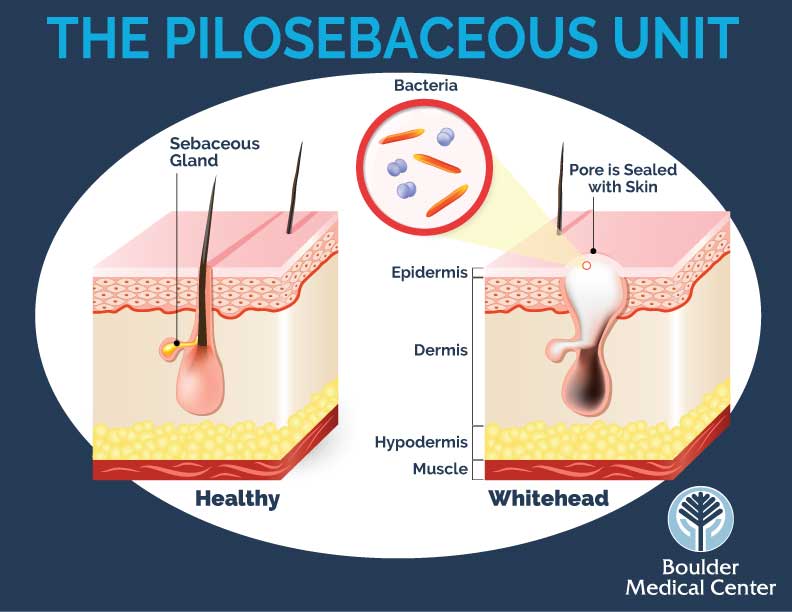Teen Acne: Is It Necessary?! (Part 1)
by Chesney Kennedy, MD
Pediatrics at Boulder Medical Center
Longmont and Boulder
You are one of the rare lucky ones if you have never had acne. Acne affects 90% of teenagers and usually starts between ages 10 to 13. It is worse in the teenage years but can extend to age 30! Many pre-teens or teens don’t think to bring the subject up with their parents or doctor, thinking they have to live with acne and suffer through it. Not true.
There are many excellent acne treatments. We all know that acne can be depressing and can cause permanent scars on the face, chest, and back. We feel better emotionally when our complexions are clearer. Acne treatments can clear our complexions, prevent scars, and give us a skip in our steps.
In this article–the first of a two-part series–I will discuss what causes acne and good basic skin care for teens. In part two I’ll discuss current news on acne treatments.
*****
First, a few notes:
- Note #1: For this article, I use the words “male” and “female” as related to the sex one is assigned at birth (or the physical traits your child was born with). In addition, gender identity matters when it comes to acne treatment. Your doctor needs to know your child’s gender identity to prescribe the best treatment.
- Note #2: Although I mention many products and medications in this article, I receive zero funding from them and have no financial incentives.
- Note #3: The information provided in this blog is for general informational purposes only and is not intended as a substitute for professional medical advice, diagnosis, or treatment. Always seek the advice of your physician or other qualified health provider regarding a medical condition. Never disregard or delay seeking professional medical advice because of something you have read on this blog. If you think you may have a medical emergency, call 911 immediately.
*****
What Causes Acne?
To understand acne, we must start with the pore, the pilosebaceous unit.
Three things act on the pilosebaceous unit to cause acne: hormones, inefficient skin cell turnover, and bacteria.
- Hormones
At the bottom of the pilosebaceous unit is a gland controlled by hormones. The gland produces sebum – the oily substance that collects in your pores to form acne. Hormones can cause overproduction of sebum. One of these hormones is testosterone, typically considered the male hormone, but females make some testosterone, too. Stress can cause testosterone levels to increase, which is why stress makes your acne worse. The other hormone that affects acne is progesterone. Females get a surge of progesterone before their period starts. This explains why acne often gets worse right before a period. Many acne treatments target hormones, as seen in my second article. - Inefficient Skin Cell Turnover
This condition can cause dead skin cells to create a keratin plug in the pilosebaceous unit. It helps to imagine a blocked oil well. The oil can’t reach the skin’s surface, so it accumulates deep in the pilosebaceous unit and can form whiteheads. Or, oil can build up pressure and explode like a volcano. If the plug explodes down deep, cysts can form. If it pops toward the top, you get a pus-filled bump on the skin’s surface (the classic pimple). A blackhead is created when the oil comes to the surface and oxidizes, causing the color to darken. Over-the-counter pore strips will remove a blackhead’s dark color for a couple of days, but the oil re-oxidizes, so this is not a great long-term solution (but it might be handy before prom). Many acne medications work by increasing skin cell turnover to prevent plugs from forming in the first place. - Bacteria: The bacteria called Propionibacterium acnes (P. acnes) that we all have on our skin contributes to acne formation, and many acne treatments target this bacteria.
Can Foods Cause Acne?
There used to be a myth that overeating chocolate caused acne, but a classic study from 1969 in the Journal of American Medical Association showed this is probably not the case. However, the study group only ate one chocolate bar per day, and diets were healthier in 1969. Now, we have newer studies that show high glycemic diets and diets high in sugar make acne worse. We think this is because sugar can cause more inflammation in the body. So limit sugar intake and eat plenty of fruits and vegetables, healthy proteins, and slow-burning carbohydrates like beans, lentils, quinoa, brown rice, whole grains, or sweet potatoes.
Skin Care 101 for Teens With or Without Acne
- Morning
- Step 1 — Cleanse. When you enter a drug store aisle, you will see many facial cleansers targeting acne. These products may have benzoyl peroxide or salicylic acid. Unfortunately, these skin cleansers only stay on your face for about 5 seconds before rinsing and will not do much to help your skin. Instead, I recommend a gentle skin cleanser like Cerave, Cetaphil liquid cleansers, or Dove soap with no fragrance. If your face is not too oily in the morning, using a cleanser may be unnecessary. You can splash your face with water to wake up.
- Step 2 — Possibly use acne medication, depending on your regimen. See my next article.
- Step 3 — Moisturize if your skin is dry. Although everyone has different skin conditions, skin is typically quite oily during our teens, and we may not need a moisturizer. However, some acne medicines can make your skin dry. Or maybe you live in a dry climate (like we do in Colorado) and need extra moisture. You may need to experiment. I recommend a non-comedogenic moisturizer, meaning the product will not clog your pores. Here are some non-comedogenic moisturizers:
- Cerave PM Facial Moisturizing Lotion
- Cerave Moisturizing Cream
- Cerave Ultralight moisturizing Face Gel
- Cetaphil Moisturizing Cream
- Paula’s Choice Clear Oil Free Moisturizer
- Other: A few drops of hempseed or argan oil are considered non-comedogenic if you want to try something natural.
- Step 4 — Apply sunscreen (at least SPF 30). The earlier you start using a daily face sunscreen, the better. It prevents skin cancer, wrinkles, and dark spots later in life. In addition, most acne medications make your skin more sensitive to the sun, so sunscreen is essential. A zinc-based, non-comedogenic sunscreen is ideal for teens with acne. Zinc is safer for our bodies and the environment. Ideas for products are:
- Cerave Hydrating Mineral Sunscreen SPF 30 Sheer Tint
- Cerave Hydrating Mineral Sunscreen for Face SPF 50
- Cetaphil Sun 30 Sheer Mineral Sunscreen
- Cetaphil Sun 50 Sheer Mineral Sunscreen
- Differin oil-absorbing moisturizer
- Eucerin Sensitive Tinted Mineral Face Sunscreen SPF 35
- Tower 28 SPF 30: comes in lots of different tints and excellent natural ingredients
- Neutrogena Sheer Zinc Face SPF 50
- SkinCeuticals Physical Fusion UV Defense SPF 50 Mineral Sunscreen
- Evening
- Step 1 — Cleanse
- Step 2 — Acne medication, depending on your regimen
- Step 3 — Moisturize if your skin is dry
In this article, I covered what causes acne and a good basic skin care regimen for teenagers. Next, I discuss acne treatments. Do not suffer in silence with your acne! They are excellent at therapies for it.
References
- Ashton R, et al. Acne Vulgaris in the Pediatric Patient. Pediatr Rev. 1019: 40 (11): 577-589
- Zaenglein AL, et al. Guidelines of care for managing acne vulgaris [published correction appears J. Am Acad Dermatol. 2020 Jun: 82 (6): 1576]. J Am Aced Dermatol. 2016: 74 (5): 945-73.e33
- Peds Rap podcast Pediatric Acne Part 1 and Part 2 with Parul Bhatia, MD, and Karen Sherwood, MD
About Chesney Kennedy
Pediatrician in Longmont and Boulder
 Dr. Chesney Kennedy is your dedicated partner in pediatric healthcare, serving families in Longmont and Boulder, Colorado. With a solid commitment to the well-being of children and teenagers, she goes above and beyond to create an inclusive and welcoming environment for all, including the LGBTQIA+ community, ensuring that everyone feels comfortable and respected in her practice. Specializing in:
Dr. Chesney Kennedy is your dedicated partner in pediatric healthcare, serving families in Longmont and Boulder, Colorado. With a solid commitment to the well-being of children and teenagers, she goes above and beyond to create an inclusive and welcoming environment for all, including the LGBTQIA+ community, ensuring that everyone feels comfortable and respected in her practice. Specializing in:
General Pediatrics
- Newborn Care
- Well-Child and Preventive Care
- Personalized Primary Care: Tailored healthcare solutions to address the unique needs of each child
- Sick Visits
- Mental Health: Support for depression, anxiety, and ADHD
- Sports Physicals
- Vaccinations
Teens
Dr. Chesney’s services for teens include:
- Birth Control: Providing a range of options, including IUDs, Nexplanon®, birth control pills, Depo shots, and counseling
- Emergency Contraception: Offering Plan B
- Heavy Periods: Dr. Kennedy is here to address and manage heavy and irregular menstrual cycles
- Pregnancy Options & Counseling
- Sexually Transmitted Infections: Offering testing, diagnosis, and treatment
- Acne


